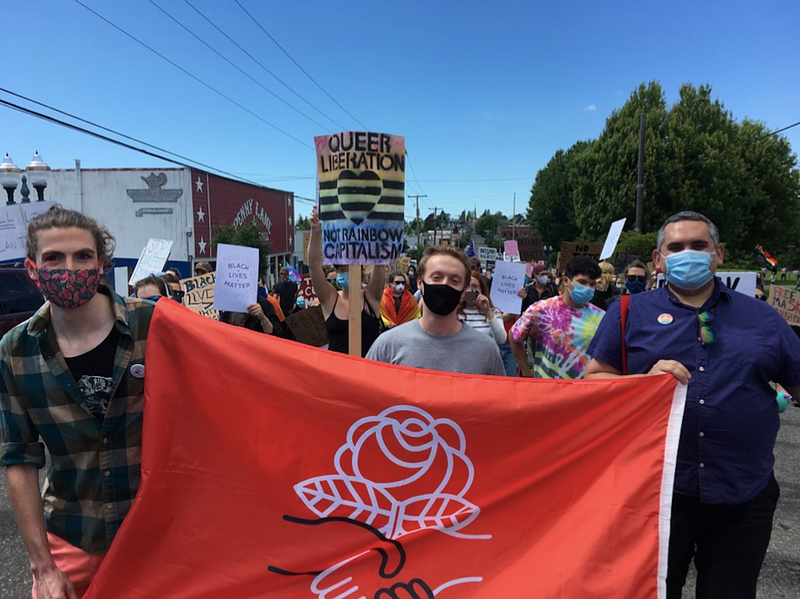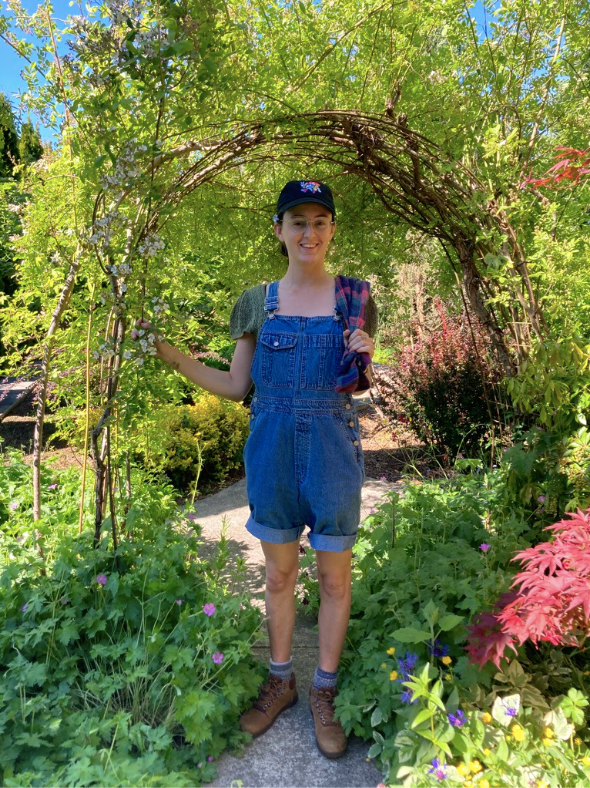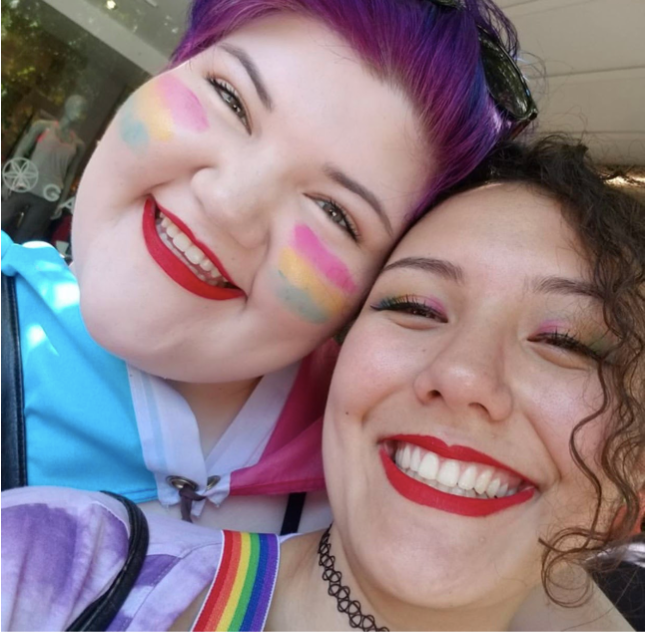Friendship, Celebration and Pride
A reflection of Pride Month and the beauty of queer visibility in 2021.
Story by Brianna Poulos
Pride month is marked by colorful celebrations, vibrant people, and community marches, but for many, their June experiences have felt different because of the COVID-19 global health crisis and sociopolitical unrest.

Back to “Grassroots” Celebration
Colton Lanning is a recent Western graduate with degrees in political science and Japanese. He believes community is the root of Pride’s sense of celebration.
Lanning is passionate about political organizing, and spent time as a student in Bellingham working with the Whatcom Democratic Socialists of America (DSA).
With Whatcom DSA, Lanning helped put on a number of events, including Stonewall was a Riot — a march in solidarity with the Black Lives Matter movement in lieu of Bellingham Pride 2020. The event took place on June 28, 2020, and over 400 people attended in support.
Lanning said he found a strong sense of community in political organizing. He felt surrounded by people whose experiences and worldviews reflected his own and he said sharing space with them was empowering.
“Community is like a friendship on a much larger magnitude,” said Lanning. “It’s a network of folks who are there to support you, offer advice, and guide you through things you’re going through.”
In high school, Lanning said he didn’t know anyone else who was queer.
“There was no one and nothing to remind me that I wasn’t alone,” he said.
Lanning first attended a Pride event in June 2018. He said he was overwhelmed by the feeling of being understood by everyone there. For the first time, he felt like he could see himself in the people surrounding him.
“Pride month plays a really significant role in the queer community,” Lanning said. “It’s representation and connection being made visible. It’s about the queer community deciding to actively take up space to be seen and heard.”
For Lanning, Pride provides a timeless and emotionally powerful reminder that he is not alone. Feeling strong within a community makes him feel truly safe and utterly excited to be himself.
Lanning said he felt a similar sense of comfort when he studied queer history and politics at Western. When queer individuals are together to discuss issues specific to queer identities, he said he feels like he can speak freely without worrying about others around him feeling uncomfortable or confused by his stories, his words and his perspective.
“It feels incredibly important to create spaces intentionally to talk about issues that are specific to queer folks, and for me, that was liberating,” Lanning said.
In all of the celebrations of Pride, Lanning said rainbow merchandise and fun events are not enough. He said he feels like large corporate companies participating in Pride month aren’t genuine and are thinking more about profit.
“I can be disheartening to go to Pride events and see these major corporations there with all of their rainbow goods when I know that these are the same corporations that don’t give their employees, many of whom are queer, fair wages or benefits,” said Lanning.
“It’s not enough for companies to go to Pride and sell Pride flags. I think we need to challenge what we believe Pride to be.”
Lanning said last year has allowed for a lot of introspective conversations about Pride to happen. He used the Whatcom DSA event, Stonewall was a Riot, as an example of how last year’s Pride month better reflected the role police have played in queer history and how queer people of color are more impacted by police violence.
Lanning said he hopes challenging the purpose of Pride month will lead to more holistic connections being made within queer politics.
“We can tie things like Queer liberation, Black liberation, worker power and combating climate change because all of these things affect each other,” he said.
Lanning believes comprehensive queer politics are the key to creating life-affirming futures and genuine safety for the queer community because only then will the complexity of identity and experience will be properly seen.
A Broader View of the World
Third-year Western student Brook Castellani-Kelsay spent much of the last year traveling with friends around the U.S. before returning to Bellingham to tend to their 75 plants and return to classes at Western, where they study journalism and agriculture.

Over Zoom, Castellani-Kelsay angles their laptop to show me the collection of vinyls covering the wall behind them. Tilting the screen a little steeper, they show me the bright blue chair they are sitting on, which they painted themselves.
Castellani-Kelsay spent Pride month in Portland, Oregon, wandering around farmers markets and browsing the local eclectic goods. In the late spring of 2020, Portland’s streets, like many others around America, were spilling over with protesters marching against police violence following the death of George Floyd on May 25, 2020.
Castellani-Kelsay has lived in Bellingham for three years and said the city has played an instrumental role in their self-growth.
“It wasn’t until I moved away [from home], and I was in an almost completely unfamiliar space that I really connected with the rawest form of myself,” Castellani-Kelsay said. “That’s when I was able to really honestly answer the hard questions I had about myself and my identity.”
Castellani-Kelsay identifies as a nonbinary transfeminine. They said within a week of their self-discovery they came out to their family and close friends.
“I was like, ‘No, this is not a secret, I’m letting the world know,’” Castellani-Kelsay said.
Friends helped make Castellani-Kelsay’s transition into a new name and pronouns smooth. Castellani-Kelsay’s friends also shared clothes with them and made them feel celebrated in an important time of change.
Initially, they faced tensions with some family members, but it didn’t last.
“In general, I feel extremely respected by my loved ones,” Castellani-Kelsay said. “I know some people get kicked out of their house for coming out and I have been very privileged to avoid all of that.”
Intersectionality is a topic near and dear to Castellani-Kelsay, and they said that they understand the way their white, middle-class background has provided them with certain privileges. Despite these privileges, Castellani-Kelsay described the vulnerability they feel as a transfeminine person as an awareness they always have to have for themself.
One in four transgender people become victims of bias-driven assault, and transgender women and trans people of color are even more vulnerable to these crimes, according to a 2021 report by The National Center for Transgender Equality.
Despite the vulnerabilities confronting Castellani-Kelsay, they said that they are proud and love their identity.
“It’s given me a broader vision of the world,” said Castellani-Kelsay. “I am free to be myself. I like who I am. I enjoy being me and I love the opportunities that come with being me.”
It All Comes Down to Acceptance
For Noelani Kauanoe, community is something they are still developing after moving to college in Bellingham to study creative writing, film and French.
Kauanoe grew up in Olympia, Washington, receiving an “alternative” elementary school education at Lincoln Options, a tall building with blue-framed windows and an abundance of stained glass. At Lincoln Options, Kauanoe threw lollipops off the roof for science, raised chickens and had harvest festivals.

They have been attending Pride events since they were 14 — before they came out — because their queer friends were excited to go and bring them along, Kauanoe said.
Kauanoe described the shocking and exciting newness they felt when attending Pride: “Pride can become epicenters for people who feel marginalized or feel like they aren’t accepted in society in a greater way.”
Pride has always been exciting, Kauanoe said, remembering wearing colorful tulle tutus with their former girlfriend at a high school Pride event. However, as a 16-year-old, they also felt discomfort in the face of so many things they had yet to experience or understand.
At one Pride, Kauanoe and friends had an interaction with a woman selling triangle pendants.
“She told us that she was glad we were so interested in them but then she asked us if we knew what the triangles meant,” said Kauanoe.
The pink triangle was first used by Nazis during World War II in the persecution of queer people. During the counterculture movement of the 70s and 80s, the triangle was reclaimed by the queer community as a symbol to bring awareness to the AIDS health crisis. Today the triangle acts as a reminder of the hardships and discrimination queer people have faced and overcome.
This interaction led Kauanoe to realize that they did not know as much about queer history as they would like to.
Since then, Kauanoe said they have learned more about themselves, their identity and the queer community and history. In their own growth, Kauanoe has developed a bittersweet relationship with being a resource for other people looking to gain a similar understanding.
“I feel like a lot of minorities, queer people included, are put into a role to be their own advocates,” Kauanoe said. “It can feel like you’re forced into a position where, because someone doesn’t understand, you have to justify your existence and the existence of people like you.”
When Kauanoe came out to their mother, she was very accepting but had many questions which Kauanoe happily answered. However when those questions became about ethical dilemmas about where her mother should place her support or act in certain situations, Kauanoe had to take a step back. “I can’t answer those questions for anyone else,” they said.
Kauanoe said it is an impossible responsibility: “How do I explain to someone what Stonewall meant? How to I tell someone that people have been gay all thorough history and it’s not just a modern trend?”
Kauanoe said there are many online resources, books and movies about queer experiences, and they urge people who are seeking understanding and self-education to seek out sources openly offering information, instead of expecting queer people in general to take that responsibility.
Echoing the desire for the future expressed by both Castellani-Kelsay and Lanning, Kauanoe sighed and said, “In the end, it’s about acceptance.”
